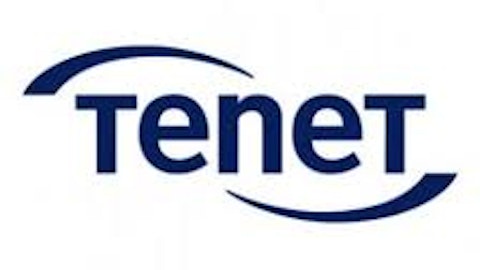You probably won’t be surprised to hear that health-care spending is growing. But you might be a little surprised to find out that that rate of growth is the lowest in a very long time.
The federal government reported that U.S. health-care spending grew at a 3.9% annual rate from 2009 through 2011. That’s the lowest growth rate since these health-care cost statistics were first tracked — way back in 1960. What’s slowing down health-care spending? Here are three key factors.

1. Spending more means spending less
A study conducted by Harvard Medical School researchers estimated that around 20% of the slowdown in health-care spending stemmed from patients spending more. Yes, you read that right.
Their research examined spending patterns for more than 10 million insured Americans between 2007 and 2011. During this period, employers shifted more costs to employees by changing insurance plan benefit designs. This resulted in higher out-of-pocket spending by employees but a slower increase in total spending than in the past.
A surge of enrollment in defined-benefit, consumer-directed health plans, or CDHPs, also occurred during roughly the same time frame — from 3% in 2006 to 16% in 2012. These plans put more control in the hands of individuals and often include higher co-pays and deductibles.
As Americans bore more of the burden in paying for health care themselves, utilization went down. Also, consumers of health-care services became smarter shoppers, comparing costs between providers.
2. Readmissions dropping
Around 70,000 fewer hospital readmissions occurred in 2012 compared to 2011 for Medicare patients according to the Centers for Medicare and Medicaid Services, or CMS. This amounted to a 0.6% drop in Medicare’s average 30-day hospital readmission rate — from 19% to 18.4%.
That might not seem like a lot at first glance. Consider, though, that readmissions cost the Medicare program around $26 billion annually. A 0.6% percent drop in the average readmission rate amounts to more than $150 million saved.
While CMS stated that “reasons behind the apparent reduction are not yet clear and merit further investigation,” one factor seems to be important. A provision of the Affordable Care Act, or ACA, began penalizing hospitals with high readmission rates in October 2012. Many hospitals had already implemented programs to reduce readmissions in anticipation of the financial disincentive, driving down readmission rates for all of 2012.
3. Quality getting better
According to the Centers for Disease Control and Prevention (CDC), hospitals have made tremendous improvement in reducing health care-associated infections. For example, the CDC reported a 41% reduction in central line-associated bloodstream infections between 2008 and 2011. To put that decrease in perspective, CMS pays an estimated $26,000 for each infection.
Technology is helping some health-care providers improve care. A study by Weill Cornell Medical College researchers found that 56% of physicians who used electronic health record, or EHR, systems provided significantly better quality of care than other physicians using paper records in four targeted measures.
Similarly, a study published in Health Services Research concluded that hospitals that used EHR systems to achieve “stage 1 meaningful use” objectives established by the federal government also experienced quality improvement. One interesting observation from this research, though, was that hospitals that used the most advanced systems actually saw decreased quality levels. Dartmouth’s Dr. Eric Johnson, a researcher for the study, suggested that this effect could be the result of hospitals neglecting process redesign as they implemented new technology.
Better quality doesn’t always lead immediately to lower costs in every case. However, as former CMS Administrator Dr. Mark McClellan noted in recent testimony before Congress, focusing on quality of care for each person is the “fundamental strategy for addressing health-care cost growth.”
Investing angle
There are several ways that investors can profit from these trends. For example, if consumers gain increasingly more control over how they spend their health-care dollars, they will need solid information to make decisions.
WebMD Health Corp. (NASDAQ:WBMD) ranks as one of the most well-known and trusted sources of health information for consumers. The online health information provider went through tough times in 2011 and 2012 as big pharmaceutical companies cut back on advertising. However, WebMD Health Corp. (NASDAQ:WBMD) seems to have turned the corner, with shares more than doubling so far this year.
As readmissions drop, that could hurt hospitals’ bottom lines — unless overall admissions increase. Several major hospitals have reported weak admissions rates in 2013. They’re counting on a higher number of insured patients with implementation of the Affordable Care Act’s individual mandate to help address the problem.
Hospital chain Community Health Systems (NYSE:CYH) should benefit if the positives expected from the ACA are realized. The stock is up nearly 30% this year. Community Health Systems (NYSE:CYH) recently announced a buyout of Health Management Associates Inc (NYSE:HMA) as part of its plans to better take advantage of health reform. This merger should give the chain more leverage in price negotiations.
EHR vendors could present a good way to play the quality-improvement angle. While several of these stocks are trading at a premium, McKesson Corporation (NYSE:MCK) doesn’t look very expensive. Part of the reason is that much of its business stems from its medical supplies business, which isn’t as exciting as technology. However, while the company’s technology division only accounts for 3% of McKesson Corporation (NYSE:MCK)’s total sales, it makes up more than 20% of earnings.
The article 3 Reasons Americans’ Health-Care Spending Is Slowing originally appeared on Fool.com and is written by Keith Speights.
Fool contributor Keith Speights has no position in any stocks mentioned. The Motley Fool recommends McKesson.
Copyright © 1995 – 2013 The Motley Fool, LLC. All rights reserved. The Motley Fool has a disclosure policy.




